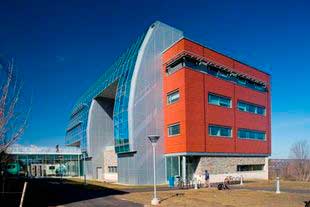Sep 22 2008
Just as platinum is among the most precious of metals, platinum certification is the most valued of LEED (Leadership in Energy and Environmental Design) benchmarks set by the U.S. Green Building Council (USGBC). The recently opened Dorothy D. and Roy H. Park Center for Business and Sustainable Enterprise — home of the Ithaca College School of Business — has become the first facility for a college or university business school in the world to attain that standard.
 Park Center for Business and Sustainable Enterprise at Ithaca College
Park Center for Business and Sustainable Enterprise at Ithaca College
The Park Center for Business and Sustainable Enterprise joins a select group of fewer than 100 buildings in the world to be certified platinum by the USGBC, with fewer than a dozen of those located on a U.S. college or university campus.
All the more noteworthy is the fact that Ithaca College could soon have a second platinum LEED building. Currently under construction adjacent to the school is a new administration building, which will house offices for admission, human resources and graduate studies as well as senior administrators. That facility, which was designed by HOLT Architects to meet platinum LEED standards, is expected to be completed later this fall.
The Park Center for Business and Sustainable Enterprise was designed by Robert A.M. Stern Architects, with Atelier 10 serving as the environmental design consultant. Numerous innovative features help reduce the building’s overall carbon footprint, including:
- A vegetated roof to help control wastewater runoff and provide a thermal cushion against significant temperature fluctuation.
- Heat and light from a multistory, south-facing wall of glass to dramatically reduce energy consumption.
- Extensive use of natural lighting throughout the building, minimizing energy needs.
- A white roof to reduce heat load in the building.
- Purchase of 50 percent of the electricity used for the building from renewable sources.
- A storm water reclamation system for use with the building’s plumbing.
- A physical environment intentionally created to encourage a sense of community, shared purpose and collaboration.
“We are delighted to earn platinum-level status and to help advance Ithaca College’s goal of becoming one of the nation’s leading proponents of sustainability,” said Susan West Engelkemeyer, dean of the School of Business. “This project allows the school to clearly demonstrate the triple bottom line of people, planet, and prosperity. While the building’s design reduces energy and water consumption — and consequently utility costs — it also maximizes views and natural light and facilitates community-building through its soaring atrium and smaller meeting spaces.”
For more information on the Park Center for Business and Sustainable Enterprise, visit http://www.ithaca.edu/business/newbuilding/ .
Ithaca College’s leadership in sustainability education and operations also received a significant boost with the recent awarding of a three-year, $500,000 grant from the HSBC in the Community (USA) Inc. Foundation.
Given to the Environmental Studies Program, the grant will fund a number of initiatives, including:
- Scholarships to attract incoming students from diverse backgrounds with a passion for social and environmental change.
- A Scholar-In-Residence Program that will bring in exceptional speakers for two–day to two–week visits in order to provide students and faculty with diverse perspectives and ongoing inspiration to act on behalf of the environment.
- Development of a new sustainability major and minor with a broad curriculum that unites the environmental, economic, social and health aspects of sustainability through advanced systems thinking and interdisciplinary training.
- Expansion of local, regional and national outreach efforts through workshops on sustainability curriculum development that serve faculty from other institutions and development of an online certification program for sustainability coordinators in higher education as well as in the government, nonprofit, and private industry sectors.
“Ithaca College has demonstrated how to successfully combine teaching, research, operations and student life with sustainability, and we have brought together stakeholders in the region and within higher education internationally to catalyze environmental change and move towards climate neutrality,” said associate professor of biology Susan Allen-Gil, coordinator of the Environmental Studies Program.